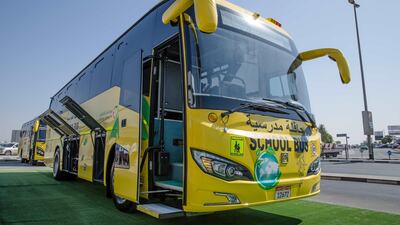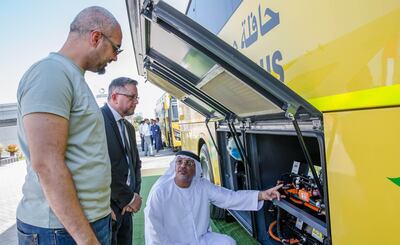Two charging stations have been added in Dubai, specifically for electric buses, as the region's first zero-emission school bus takes to the roads.
Two fully integrated bus power stations have been placed at Al Naboodah Group Enterprises and Emirates Transport bus terminal to accommodate the new electric school bus in Dubai. The systems are able to fully charge the bus batteries in four hours, according to Emirates Transport.
Last week, the operator launched the final testing phase of its first electric-powered school bus. The Chinese-built 45-seater will operate on full routes in conditions to accurately measure the performance compared to a conventional bus.
This is one of the first places in the world to have an electric school bus, although in 2019 Daimler will introduce its 81-seat version, dubbed the Jouley, in the US.
“The launch of a zero emission school bus comes as part of our efforts to achieve the vision of the Government for a green economy and puts the UAE in the forefront of such initiatives, regionally and globally,” said Mohammed Abdullah Al Jarman, general manager of Emirates Transport.
He said that the biggest challenge had been to ensure that stringent specifications and regulations of school transport were adhered to by conducting three field visits to the factory in China to inspect the production line. So far the bus has travelled 100 kilometres, compared to a conventional school bus at 150km.
One of the biggest issues was adjusting the efficiency of the air conditioning system to comply with the harsh summers in the UAE, according to Amer Al Harmoudi, executive director of Emirates Transport auto services division.
The introduction of the electric school bus is one of many areas in which Dubai is looking to meet its green mobility targets. At the start of the year, the Dubai Supreme Council of Energy, Dubai Electricity and Water Authority and the Roads and Transport Authority set out new targets to decrease carbon emissions by 16 per cent by 2021.
_______________
Read more:
More than 1,000 hybrid taxis on Dubai streets
The rise of electric cars could spell bad news for oil producers
Middle East's first hydrogen fuel station opens in Dubai
_______________
The initiative will have electric and hybrid vehicles making up 10 per cent of all the new cars purchased between 2016 and 2020. Additionally, 2 per cent of all cars in the emirate will be either electric or hybrid by 2020 and reach 10 per cent by 2030.
Dubai-based Al Naboodah, covering a variety of sectors including electrical and lighting, said that this partnership went hand-in-hand with its company strategy which includes reducing energy consumption by up to 5 per cent annually.
“We have long since supported the use of electric vehicles in our product portfolio, and through our trusted partnerships with Emirates Transport and Sunwin, this vision is becoming a reality,” said Buti Juma Al Naboodah, Al Naboodah’s deputy chief executive of commercial. “This marks a great milestone for both the nation and our group’s sustainability aims.”


